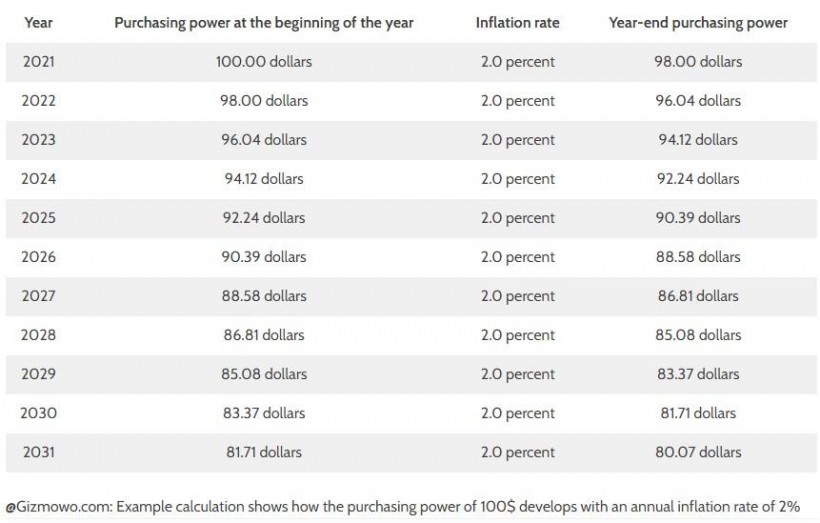
(Photo : Gerd Altmann from Pixabay)
Everything has gone up in price, from milk at the supermarket to gasoline at a gas station. This means that the US is experiencing unprecedented inflation. Everyone is being affected by record inflation, even your wallet.
100 dollars equal 100 dollars. This statement is hard to believe at first. The goods and services that you can purchase with 100 dollars may cost more than that over time. Your money may lose value if you buy more expensive goods. This form of depreciation is technically called inflation.
Before we dive into the four facts list, let's understand the main reasons behind inflation.
Main causes of inflation
What causes inflation? Inflation has three main causes:
-
Demand-pull.
-
Cost-push.
-
Inflation expectations.
Inflation is driven by demand
When the demand for goods or services exceeds the supply, then this is called demand-pull inflation. Excessive demand causes prices to rise across a wide range of goods and services, ultimately leading to inflation.
Inflation is driven by cost
When the aggregate supply (or total supply) of goods and services is lower than what can be produced, this inflation is called cost-push. An increase in production costs can often cause a fall in aggregate supply. If aggregate demand is not affected by a fall in aggregate supply, then inflation will rise.
Inflation expectations
Inflation expectations refer to the beliefs of households and businesses about future price rises. These beliefs are important as they can have an impact on current economic decisions and therefore influence inflation outcomes. For instance, if firms believe that future inflation will be higher, and they act accordingly, they might raise prices at a faster pace.
In addition, to make up for their expected loss in purchasing power, workers may ask for higher wages if they expect future inflation will be higher. These behaviours, also known as inflation psychology, can lead to higher inflation rates and make inflation expectations self-fulfilling.
4 facts you need to know about inflation
These are the 4 most important facts about this subject:
1. A stable price development ensures planning security
Stable prices are important to consumers. You can plan financially well if you are aware of the prices of food, heating oil, and building materials. It is possible to be caught off guard by sudden increases in prices, especially when it comes to major financial projects.
The Federal Reserve monitors inflation. A target inflation rate of two percent is the goal. This is because an inflation rate of around two percent is appropriate for stable economic growth. This encourages consumers and businesses to invest and make purchases immediately rather than putting them off. In addition, the relatively moderate inflation is a sign of stable price development, i.e., predictable price development.
2. Inflation destroys purchasing power
For daily shopping and when you plan to buy a home, stable prices are desirable. However, stability can be a problem for investors: Two percent of your purchasing power is not enough. However, it's clearer if you look at the difference over 10-20 years.
An example calculation from Gizmowo.com will illustrate this. This illustrates how 100-dollar purchasing power changes with an annual inflation rate of two percent.

3. Call money, or fixed-term deposits fall into the real interest rate trap.
The real interest rate trap is another problem for savers. This is especially true given current inflation levels. Because investors still get very low-interest rates for many investment products.
Although interest may be earned again from the account, it is unlikely that the money will earn any more. In reality, inflation is a major problem. Therefore, you will lose your money if you invest in a time deposit or overnight account.
4. It is possible to combat inflation
It is not practical to store money in savings, current, or time deposit accounts due to the high inflation rate and low-interest environment. You can counter inflation by investing your money with the possibility of earning a return. The right investment for you depends on your financial situation and savings goals.
You can invest in real estate. This investment can be used to rent out the property. Even though real estate prices are high in many areas, you can still get a higher return than inflation if you have good advice. This is due to increased rental income and the increase in property value. You can also live on the property.
How can you counter inflation?
There are many ways to fight inflation as individuals. A high-yield investment is a good way to combat inflation. It is better to invest in equity funds than in savings accounts or in time deposits at low-interest rates. Equity funds offer better returns and are better at compensating for inflationary losses, particularly over long periods.
* This is a contributed article and this content does not necessarily represent the views of hngn.com








